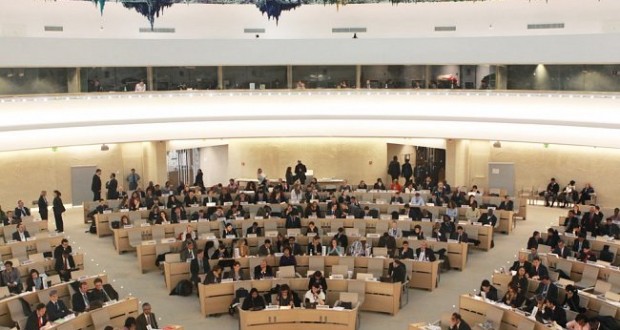In its Universal Periodic Review Interim Report, Bahrain refused France’s recommendation to commute death sentences to prison terms, commenting that in the period of 2011-2014 no death penalties were carried out. Mahir Abbas was handed a death sentence in February 2014. Bahrain’s ‘injustice system’ is prompt to hand harsh sentences against citizens accused of killing policemen, yet no policemen have been punished for more than 130 killings of citizens during the 3 year long repression of protests since 2011.
Bahrain has also refused to accept recommendations by Slovakia, Latvia, Costa Rica, Switzerland, Finland and Hungary to ratify the Rome Statute of the International Criminal Court, which’s duty is to hold those involved in crimes of genocide, crimes against humanity, war crimes, and the crime of aggression accountable.
On the other hand, among the many recommendations Bahrain has claimed it has accepted and gone about implementing is a recommendation to ratify the International Convention for the Protection of All Persons from Enforced Disappearance (ICPPED). However, families of detainees experience grave concerns because they are deprived from communication with their detained relatives. Recently, the family of Mohammed Kadhim, who was detained early September 2014, said they have not received a single phone call from him. The family approached several police stations, as well as the Criminal Investigations Department, but was not given any information regarding his whereabouts. Mohammed’s case is just one of many. Bahrain is trying to twist around recommendations to respect basic and fundamental rights of detainees such as to inform their families of their whereabouts by claiming, “work towards acceding to ICPPED is continuing”.
Regarding torture and freedom of expression, Belgium, alongside other countries, recommended incorporating into national law Bahrain’s obligations under the International Covenant on Civil and Political Rights (ICCPR), the Convention against Torture and the Convention on the Rights of the Child. Bahrain said it supported this recommendation and amended a number of existing laws and enacted a number of new ones. Moreover, it said that since 2012, legislative activity has primarily guaranteed the observance of the ICCPR including during national emergency; a blatant attempt to ignore the killings of citizens who peacefully protested for democracy and freedom and the imprisonment of political and human rights figures who remain behind bars, among hundreds, for exercising freedom of expression and peaceful assembly.
Another response, regarding the same recommendation, was that Bahrain has been deepening freedom of expression through amendments made to the Penal Code made in 2012, the first of which was; to ensure that perpetrators of different forms of torture crimes do not escape justice. Two years on, complaints of torture and coercion to sign false confessions continue to be dismissed by courts. On Sunday, Sadeq Alsha’bani, a Bahraini actor, complained of being subjected to severe torture and sexual abuse, and was threatened that his wife will also be raped. But the court dismissed his complaints and sentenced him to 5 years, along with others, on charges of inciting to topple the regime.
The aforementioned Law also rescinded Article 134, which prohibited the publishing of false news, statements or rumours abroad on conditions in the State. It also rescinded Article 174 which stipulates that it is a crime to produce, possess, distribute or paste images which could adversely affect the reputation of the Country. However, on the ground, the Court of Appeals upheld sentences on Sunday against defendants in what is known as the “Tamarrod case” with charges of using the media to incite hatred of the regime.
Alongside this, Bahrain claims that it is ensuring that any restrictions on civil and political rights are necessary, minimal and comply with ICCPR, whilst it is insisting to continue the prosecution of Al Wefaq National Islamic Society and the National Democratic Action Society, in attempt and halt peaceful political activism and dissolve the largest political society in the country just like it dissolved the Islamic Council of Scholars, the largest Shiite religious foundation in Bahrain. At the same time, it continues to prosecute Al Wefaq leaders and put human rights activists and photographers behind bars.
/129

